
The dark green fritillary is a species of butterfly in the family Nymphalidae. The insect has a wide range in the Palearctic realm - Europe, Morocco, Iran, Siberia, Central Asia, China, Korea, and Japan.

The purple-shot copper is a butterfly in the family of the Lycaenidae or copper butterflies and in the genus of the Lycaena.

Parnassius glacialis, the glacial Apollo or Japanese clouded Apollo, is a high-altitude butterfly found in Japan, eastern China and Korea. It is a member of the snow Apollo genus (Parnassius) of the swallowtail family (Papilionidae).

Erebia epistygne, the spring ringlet, is a species of butterfly in the family Nymphalidae. It is found in France and Spain. Its natural habitat is temperate grassland.

Erebia pharte, the blind ringlet, is a butterfly of the family Nymphalidae. It is an Alpine butterfly.

The water ringlet is a member of the subfamily Satyrinae of family Nymphalidae. It is a high altitude butterfly found in the Alps, Bavaria, Styria, Pyrenees, Carpathians and Bulgaria.

Coenonympha arcania, the pearly heath, is a butterfly species belonging to the family Nymphalidae. It can be found in Central Europe. It resembles Coenonympha hero. Seitz describes it thus C. arcania L.. Forewing fiery reddish yellow with black distal margin, hindwing dark brown. Easily recognised by the underside of the hindwing, whose marginal portion is occupied by a broad white band, which in the nymotypical form interrupts the row of ocelli below the apical eye, the latter therefore appearing to be placed on the inside of the white band. All Europe except great Britain, from Scandinavia to the Mediterranean sea and from Spain and France to the Black sea and Armenia. — Specimens with a very broadly black margin to the forewing and a narrowed and slightly dentate band on the underside of the hindwing, which probably occur among nymotypical specimens everywhere, but especially in the South, are considered as ab. insubrica Frey. — Larva green with dark dorsal stripe bordered with a yellowish tint, light subdorsal stripe and pale yellow lateral stripe; head blue-green, mouth and anal fork red. Until May on grasses. Pupa brown, with whitish wing-cases edged with red. Butterflies very common in June and July and often flying together in large numbers. At the edge of woods full of undergrowth, but also in the open country and on hills. They affect flying round bushes and settle on the tip of low twigs, but sometimes also fly up into the higher branches of trees. The females are much less numerous than the males and appear later.

Melitaea aurelia, or Nickerl's fritillary, is a butterfly of the family Nymphalidae. It is found in central Europe.

Lycaena helle, the violet copper, is a butterfly of the family Lycaenidae. It is found from the Pyrenees to northern Norway and from Belgium east across the Palearctic to Central Asia, Siberia and Amur.The wingspan is 24–26 mm. The butterfly flies from May to July depending on the location.

Pseudophilotes baton, the baton blue, is a butterfly of the family Lycaenidae. It is found in central and southern Europe and then east across the Palearctic to the Russian Far East.
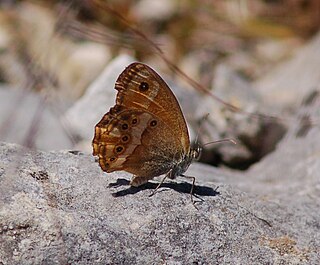
Coenonympha dorus, the dusky heath, is a butterfly of the family Nymphalidae. It is found in south-western Europe and North Africa.

Chazara briseis, the hermit, is a butterfly species belonging to the family Nymphalidae. It can be found in North Africa, southern Europe, Asia Minor, the Caucasus, Kazakhstan, Central Asia through Afghanistan, and north-western China and Tuva. It is found on steppe and in other dry grassy places between 500 and 2,500 meters.
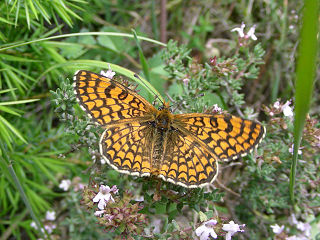
The Provençal fritillary is a butterfly in the family Nymphalidae. It is found in south-western Europe and North Africa. The range extends from the Iberian Peninsula to southern France and the Alps in Switzerland and Italy. It is also found in the Atlas Mountains.

Mimoides thymbraeus, the white-crescent swallowtail, is a species of butterfly in the family Papilionidae. It is found from Mexico to El Salvador and Honduras, where it is widespread and common.

Celastrina oreas is a small butterfly found in the East Palearctic that belongs to the lycaenids or blues family.
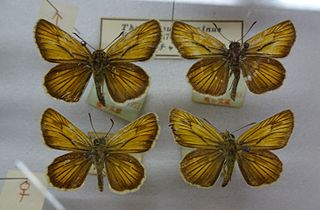
Thymelicus leonina is a small butterfly found in the East Palearctic that belongs to the skippers family.
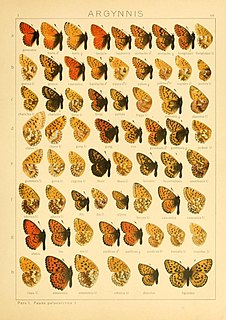
Issoria eugenia is a small butterfly found in the East Palearctic that belongs to the family Nymphalidae.
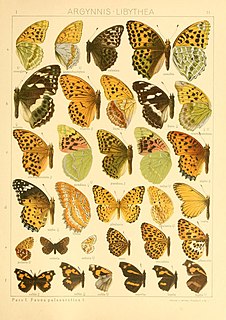
Argynnis zenobia is a butterfly found in the East Palearctic that belongs to the browns family.

Aldania yunnana is a butterfly found in the Palearctic where it is endemic to China that belongs to the browns family.
Araschnia davidis is a butterfly found in the Palearctic that belongs to the browns family. It is endemic to Tibet, West and Central China.



















